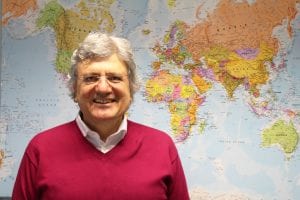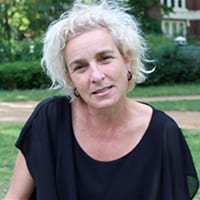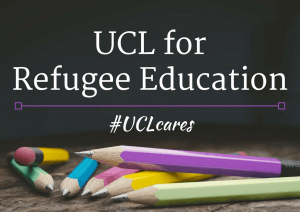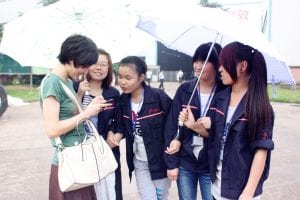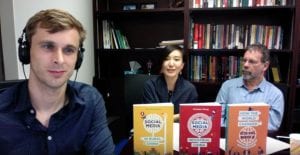Ask an academic: Dr Florian Mussgnug
By ucypsga, on 18 July 2018
 Dr Florian Mussgnug is Reader in Italian and Comparative Literature at UCL and convenor of the BA Comparative Literature, which examines world literature from diverse geographical and cultural angles.
Dr Florian Mussgnug is Reader in Italian and Comparative Literature at UCL and convenor of the BA Comparative Literature, which examines world literature from diverse geographical and cultural angles.
He has recently been appointed as an Academic Director of the Cities partnerships Programme, a cross-UCL initiative that will support, fund and promote the work UCL academics carry out with partners in global cities. He spoke to us about his work with the Rome Multidisciplinary Research Hub and his hopes for the launch of the programme.
Which events took place in Rome in 2017-18?
The Rome Multidisciplinary Research Hub has facilitated 11 collaborative projects, which were convened by UCL lead applicants from six faculties. In total, this enabled the organization of five international conferences, three symposia, six graduate training workshops, two week-long international doctoral summer schools, a piano concert and a photography exhibition. All events took place in Rome over the course of three months, between April and June 2018. More than 100 academic speakers were invited, including 37 UCL members of staff.
How did the Rome Multidisciplinary Research Hub come about?
The idea was born during a period of great apprehension, following the British EU referendum. The spectre of Brexit marked a threat to the future of UK universities, as the Provost of UCL and other university leaders were quick to point out. British universities have benefitted enormously from EU funding and from the free movement of researchers and students, and there was justified concern that prolonged political uncertainty and the noxious rhetoric of the leave campaign would put off researchers in other European countries.
A strong, positive signal was needed, especially for subjects like Modern Languages, European Studies and Comparative Literature, which rely strongly on free movement and the Erasmus student exchange programme.
What makes Rome such a fruitful location for academic collaboration?
Rome was a good place to start. The city can boost a sustained record of research collaborations with UCL, across numerous disciplines: archaeology, architecture, art history, ancient history and classical studies, the fine arts, museum studies, electronic engineering, history, modern languages, neuroscience, philosophy, political science and translation studies.
My vision has focused on strategic collaboration with high-ranking research universities and other prestigious regional partners, including Sapienza University, Roma Tre University, LUISS Guido Carli University and the British School at Rome (BSR). I have pursued this idea since 2016, thanks to three rounds of Global Engagement Funds, the Rome Regional Partnership Funds, and strategic and financial support from the Faculty of Arts and Humanities
You’ve recently been appointed as an Academic Director for UCL’s Cities partnerships Programme. What are you most looking forward to about the project?
The political crisis in the Mediterranean has moved Italy to the forefront of international attention, making it a vital context for important debates about the identity and future of Europe. More than 50 years after the Treaty of Rome, the Italian capital remains a powerful symbol of European unity.
But Rome has also come to be associated with new risks and challenges: the rise of right-wing populism in Europe, the need to re-think national sovereignty in an age of planetary connectedness; the political causes and consequences of involuntary migration or forced immobility. What draws me to Rome, above and beyond the city’s unrivalled wealth of historical sites and cultural artefacts, is the wish to respond actively and fully to these challenges, in line with UCL’s distinctive ethos of cosmopolitanism, radicalism and innovative thinking.
What are you hoping to achieve through the Cities partnerships Programme?
Educated in Britain, Italy and Germany, I am proud of UCL’s reputation as a global academic leader in continental Europe, and applaud our commitment to international excellence. As Academic Director of the Cities partnerships Programme, I will seek to consolidate UCL’s important role through new initiatives and by strengthening the strategic partnerships that have already emerged.
I also wish to map and promote relevant expertise across UCL. The “UCL in Rome” working party, founded in 2016, already comprises over 50 UCL researchers with a specific interest in Italy, based in eight faculties and 19 departments.
How does this approach differ from UCL’s previous international engagement in Rome?
Members of the working party have advanced exciting proposals for joint degrees, pre-university orientation weeks, research fellowships, internships and fixed-term double appointments. I look forward to testing these ideas in the context of the Cities partnerships Programme. Regional engagement funding will continue, and some high-profile initiatives are already planned for 2018-19.
In September, a ceremony at the British School at Rome (BSR) will honour the Italian filmmaker and Slade alumna Lorenza Mazzetti, who will be awarded a UCL Honorary Fellowship. In January, the Provost will visit Sapienza University to address the assembly that opens the academic year in Italy. I also look forward to working closely with Dr Claire Colomb, who will lead activities in Paris. We both welcome this important opportunity to shape debates about the future of higher education in Europe, and to strengthen internationally collaborative research and research-based learning.
 Close
Close



